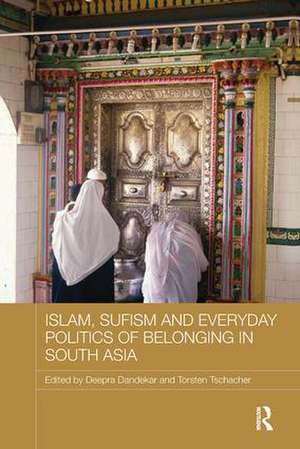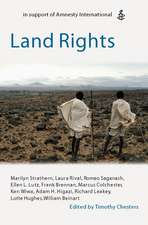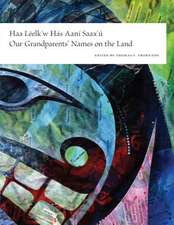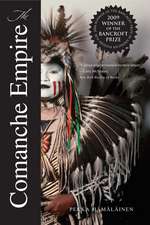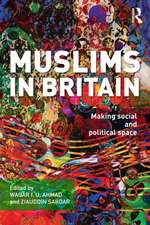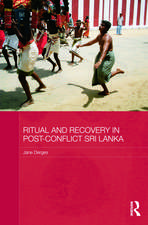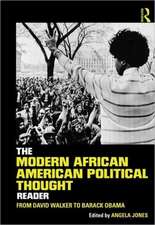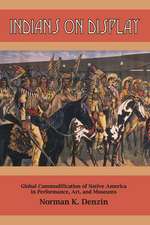Islam, Sufism and Everyday Politics of Belonging in South Asia: Routledge Advances in South Asian Studies
Editat de Deepra Dandekar, Torsten Tschacheren Limba Engleză Paperback – 17 apr 2018
Looking at examples from five countries in South Asia (India, Pakistan, Bangladesh, Sri Lanka, and Afghanistan), the book begins with a detailed introduction to political concerns over ‘belonging’ in relation to questions concerning Sufism and Islam in South Asia. This is followed with sections on Producing and Identifying Sufism; Everyday and Public Forms of Belonging; Sufi Belonging, Local and National; and Intellectual History and Narratives of Belonging. Bringing together scholars from diverse disciplines, the book explores the connection of Islam, Sufism and the Politics of Belonging in South Asia. It is an important contribution to South Asian Studies, Islamic Studies and South Asian Religion.
| Toate formatele și edițiile | Preț | Express |
|---|---|---|
| Paperback (1) | 304.68 lei 6-8 săpt. | |
| Taylor & Francis – 17 apr 2018 | 304.68 lei 6-8 săpt. | |
| Hardback (1) | 823.57 lei 6-8 săpt. | |
| Taylor & Francis – 13 sep 2016 | 823.57 lei 6-8 săpt. |
Din seria Routledge Advances in South Asian Studies
-
 Preț: 349.17 lei
Preț: 349.17 lei -
 Preț: 321.41 lei
Preț: 321.41 lei -
 Preț: 317.67 lei
Preț: 317.67 lei - 16%
 Preț: 298.10 lei
Preț: 298.10 lei - 26%
 Preț: 567.75 lei
Preț: 567.75 lei - 20%
 Preț: 184.81 lei
Preț: 184.81 lei - 16%
 Preț: 323.44 lei
Preț: 323.44 lei -
 Preț: 420.08 lei
Preț: 420.08 lei -
 Preț: 415.67 lei
Preț: 415.67 lei -
 Preț: 276.84 lei
Preț: 276.84 lei - 14%
 Preț: 301.13 lei
Preț: 301.13 lei - 15%
 Preț: 721.51 lei
Preț: 721.51 lei - 25%
 Preț: 766.66 lei
Preț: 766.66 lei -
 Preț: 485.46 lei
Preț: 485.46 lei - 18%
 Preț: 1001.84 lei
Preț: 1001.84 lei - 18%
 Preț: 1052.35 lei
Preț: 1052.35 lei -
 Preț: 416.96 lei
Preț: 416.96 lei - 16%
 Preț: 298.41 lei
Preț: 298.41 lei - 18%
 Preț: 1001.07 lei
Preț: 1001.07 lei - 18%
 Preț: 1110.81 lei
Preț: 1110.81 lei - 18%
 Preț: 1058.79 lei
Preț: 1058.79 lei -
 Preț: 486.71 lei
Preț: 486.71 lei - 15%
 Preț: 675.24 lei
Preț: 675.24 lei -
 Preț: 278.75 lei
Preț: 278.75 lei - 18%
 Preț: 1054.97 lei
Preț: 1054.97 lei -
 Preț: 418.22 lei
Preț: 418.22 lei -
 Preț: 416.22 lei
Preț: 416.22 lei -
 Preț: 279.94 lei
Preț: 279.94 lei - 30%
 Preț: 846.53 lei
Preț: 846.53 lei -
 Preț: 371.68 lei
Preț: 371.68 lei - 16%
 Preț: 297.62 lei
Preț: 297.62 lei - 18%
 Preț: 1053.95 lei
Preț: 1053.95 lei - 15%
 Preț: 699.73 lei
Preț: 699.73 lei
Preț: 304.68 lei
Preț vechi: 344.17 lei
-11% Nou
Puncte Express: 457
Preț estimativ în valută:
58.31€ • 63.31$ • 48.98£
58.31€ • 63.31$ • 48.98£
Carte tipărită la comandă
Livrare economică 22 aprilie-06 mai
Preluare comenzi: 021 569.72.76
Specificații
ISBN-13: 9781138593039
ISBN-10: 1138593036
Pagini: 380
Ilustrații: 38
Dimensiuni: 156 x 234 mm
Greutate: 0.7 kg
Ediția:1
Editura: Taylor & Francis
Colecția Routledge
Seria Routledge Advances in South Asian Studies
Locul publicării:Oxford, United Kingdom
ISBN-10: 1138593036
Pagini: 380
Ilustrații: 38
Dimensiuni: 156 x 234 mm
Greutate: 0.7 kg
Ediția:1
Editura: Taylor & Francis
Colecția Routledge
Seria Routledge Advances in South Asian Studies
Locul publicării:Oxford, United Kingdom
Public țintă
PostgraduateCuprins
Introduction: Framing Sufism in South Asian Muslim Politics of Belonging
Part 1: Producing and Identifying Sufism
1. Sufis, Dervishes and Alevi-Bektaşis: Interfaces of Heterodox Islam and Nationalist Politics from the Balkans, Turkey and India
2. Who’s the Master? Understanding the Religious Preceptors on the Margins of Modernized Religions
3. Islamic and Buddhist Impacts on the Shrine at Daftar Jailani, Sri Lanka
4. Longing and Belonging at a Sufi Saint Shrine Abroad
Part 2: Everyday and Public Forms of Belonging
5. The Politics of Gender in the Sufi Imaginary
6. The Everyday as an Enactment of the Trauma of Being a Muslim Woman in India: A Study of Two Artists
7. Who Is In? Who Is Out? Social vs Political Space in the Sufi Shrines of Shah Abdul Latif Bhitai and Syed Pir Waris Shah in Sindh and Punjab, Pakistan
8. The Survival of the Syncretic Cults of Shirdi Sai Baba and Haji Ali despite Hindu Nationalism in Mumbai
Part 3: Sufi Belonging, Local and National
9. Abdul Kader Mukadam: Political Opinions and a Genealogy of Marathi Intellectual and Muslim Progressivism
10. From ‘Rational’ to ‘Sufi Islam’? The Changing Place of Muslims in Tamil Nationalism
11. "Sindhis are Sufi by Nature": Sufism as a Marker of Identity in Sindh
12. The Politics of Sufism on the Ground: The Political Dimension of Pakistan’s Largest Sufi Shrine
Part 4: Intellectual History and Narratives of Belonging
13. A Garden of Mirrors: Retelling the Sufi Past and Contemporary Muslim Discourse
14. "Islamic Renaissance", Sufism and the Nation-State: A Debate in Kerala
15. Mullā Vajhī’s Sab Ras
16. Sufism in Bengali wa‘z mahfils
Part 1: Producing and Identifying Sufism
1. Sufis, Dervishes and Alevi-Bektaşis: Interfaces of Heterodox Islam and Nationalist Politics from the Balkans, Turkey and India
2. Who’s the Master? Understanding the Religious Preceptors on the Margins of Modernized Religions
3. Islamic and Buddhist Impacts on the Shrine at Daftar Jailani, Sri Lanka
4. Longing and Belonging at a Sufi Saint Shrine Abroad
Part 2: Everyday and Public Forms of Belonging
5. The Politics of Gender in the Sufi Imaginary
6. The Everyday as an Enactment of the Trauma of Being a Muslim Woman in India: A Study of Two Artists
7. Who Is In? Who Is Out? Social vs Political Space in the Sufi Shrines of Shah Abdul Latif Bhitai and Syed Pir Waris Shah in Sindh and Punjab, Pakistan
8. The Survival of the Syncretic Cults of Shirdi Sai Baba and Haji Ali despite Hindu Nationalism in Mumbai
Part 3: Sufi Belonging, Local and National
9. Abdul Kader Mukadam: Political Opinions and a Genealogy of Marathi Intellectual and Muslim Progressivism
10. From ‘Rational’ to ‘Sufi Islam’? The Changing Place of Muslims in Tamil Nationalism
11. "Sindhis are Sufi by Nature": Sufism as a Marker of Identity in Sindh
12. The Politics of Sufism on the Ground: The Political Dimension of Pakistan’s Largest Sufi Shrine
Part 4: Intellectual History and Narratives of Belonging
13. A Garden of Mirrors: Retelling the Sufi Past and Contemporary Muslim Discourse
14. "Islamic Renaissance", Sufism and the Nation-State: A Debate in Kerala
15. Mullā Vajhī’s Sab Ras
16. Sufism in Bengali wa‘z mahfils
Notă biografică
Deepra Dandekar is an Associate Member of the Asia and Europe in a Global Context Cluster of Excellence at Heidelberg University, Germany , and works on Gender and Religion in Maharashtra.
Torsten Tschacher is Junior-Professor of Muslim Culture and Society in South Asia at Freie Universität Berlin, Germany. His research focuses on the history of Tamil-speaking Muslim societies in South India, Sri Lanka, Singapore, and Malaysia.
Torsten Tschacher is Junior-Professor of Muslim Culture and Society in South Asia at Freie Universität Berlin, Germany. His research focuses on the history of Tamil-speaking Muslim societies in South India, Sri Lanka, Singapore, and Malaysia.
Descriere
This book looks at the study of ideas, practices and institutions in South Asian Islam, commonly identified as ‘Sufism’, and how they relate to politics in South Asia. While the importance of Sufism for the lives of South Asian Muslims has been repeatedly asserted, the specific role played by Sufism in contestations over social and political belonging in South Asia has not yet been fully analysed.
